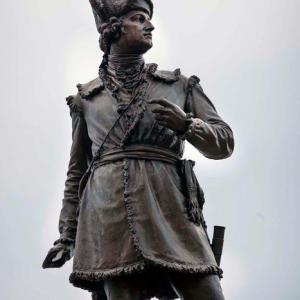Why Cowpens?
Why, exactly, is it called the Battle of Cowpens? Was Cowpens the name of one of the commanders who led the Patriots to victory over Lt. Col. Banastre Tarleton? Maybe it's the name of the man who owned the field where the battle was fought? No. Cowpens is exactly what it sounds like if you break it up into its component parts – cow pens.
There is a saying that a squirrel traveling in the southeastern United States before the arrival of the Europeans in the 16th century could go from the Atlantic Ocean to the Mississippi River without ever touching the ground. This saying developed from the belief that the entire region was one continuous forest until European settlers arrived and began cutting trees. As romantic as that sounds, it's not accurate. To be sure, there were large tracts of enormous hardwood forests, particularly in the South Carolina backcountry, but there were also open grasslands of varying sizes in the region. Some of these were naturally occurring fields while others were cleared by Native Americans for agriculture. The cow pens was one of these clearings and because it served a very important role for trade and travel in the South Carolina backcountry, it was a location well known to many during that time.
One of the major roads in the area before the American Revolution was the Green River Road. It ran from the Pacolet River in eastern Spartanburg County northward to the Green River in North Carolina. This road was commonly used as a trade route by settlers traveling this region. Located along the Green River Road a few miles before it entered North Carolina was an open space known as the cow pens. The cow pens was used as a place for cattle to graze as they were moved along the road. In the winter of 1781 when Gen. Daniel Morgan and his army were operating near the Pacolet River, he sent a call for the militia to rendezvous with him at the cow pens to oppose Lt. Col. Tarleton. The militia met him there and the battle against the British in that place is one of the most celebrated victories in American military history.
Sometime after the battle, the space between the two words was dropped and it became Cowpens. The Town of Cowpens, located 9 miles south of the battlefield in eastern Spartanburg County, was incorporated in 1900 and the actual cow pens is today a National Park. Not bad for a place that used to be just a rest stop for cattle!





